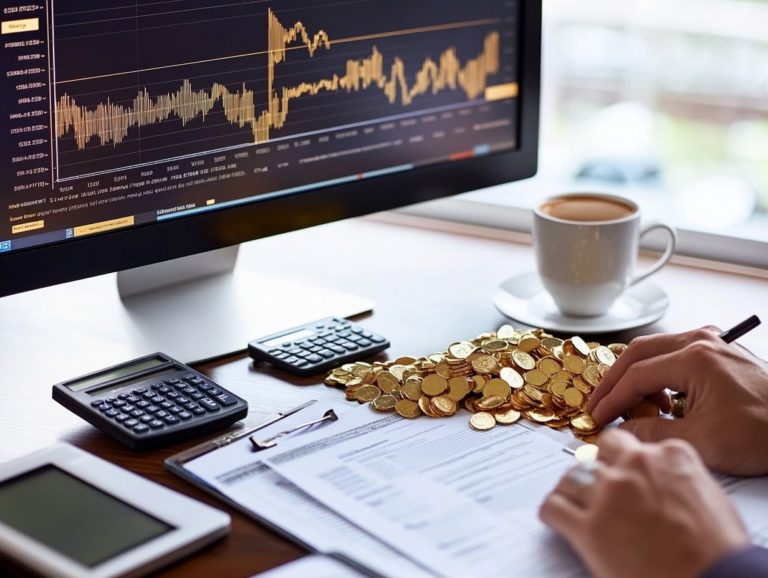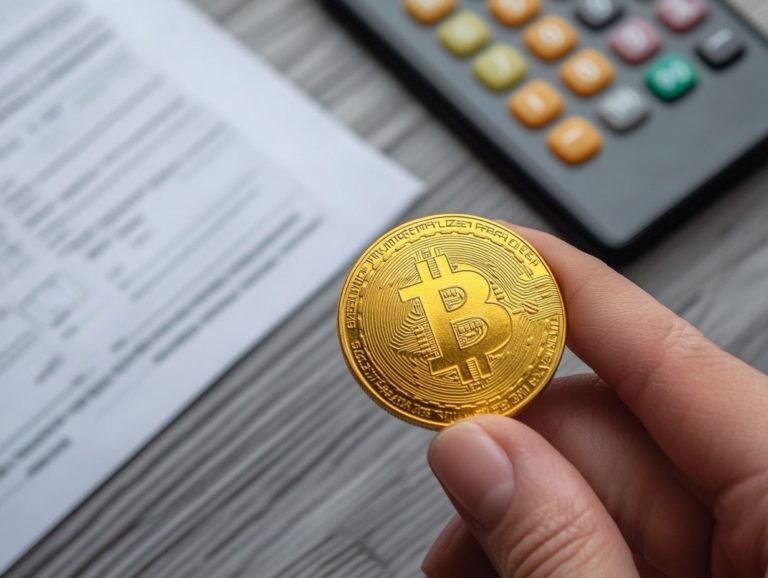Tax Implications of Precious Metals in Business Transactions
Navigating the world of precious metals can be both exhilarating and intricate, particularly when it comes to their role in business transactions.
This article explores the various types of precious metals and their definitions, while shining a light on the important tax implications that arise when you buy, sell, or use these assets as payment.
From capital gains taxes to international considerations, you’ll discover powerful strategies that could save you money while ensuring compliance.
Whether you’re an investor, a business owner, or simply someone with a keen interest, this guide will equip you with the knowledge necessary to make informed decisions in the fascinating realm of precious metals.
Contents
- Key Takeaways:
- Overview of Precious Metals in Business Transactions
- Tax Implications of Buying and Selling Precious Metals
- Using Precious Metals as Payment
- Investing in Precious Metals
- Tax Implications for International Transactions
- Smart Tax Strategies for Your Precious Metals Investments!
- Gifting Precious Metals
- Frequently Asked Questions
- What are the tax implications of using precious metals in business transactions?
- Do I have to pay sales tax when purchasing precious metals for my business?
- Are there any tax breaks for businesses that use precious metals?
- How are taxes calculated when selling precious metals as part of a business transaction?
- Are there any tax consequences if my business receives payments in the form of precious metals?
- What are the reporting requirements for businesses using precious metals in transactions?
Key Takeaways:
- Precious metals like gold and silver can affect your taxes.
- Understand capital gains tax when you buy or sell.
- Plan your taxes to reduce liabilities with precious metals.
Overview of Precious Metals in Business Transactions
Recently, precious metals like gold, silver, platinum, and palladium have become increasingly important in business transactions. They now serve not only as a hedge against inflation but also as valuable capital assets that warrant your careful attention as an investor or business owner.
The IRS s classification of these metals can profoundly influence your investment strategies and financial planning, especially when it comes to buying, selling, or using these assets as forms of payment.
Understanding these nuances is essential for optimizing your investment portfolio and effectively navigating the complex landscape of precious metals in business dealings.
Tax Implications of Buying and Selling Precious Metals
The tax implications of buying and selling precious metals are complex and mainly focus on capital gains tax, which can significantly impact your net earnings from these transactions. Whether you’re trading physical gold or silver, the classification of gains as short-term or long-term can lead to different tax obligations under IRS regulations.
Understanding these tax nuances is crucial for you as an investor or business owner, allowing you to ensure compliance while maximizing your returns.
Capital Gains Tax
Capital gains tax applies when you profit from selling precious metals, and it s important to grasp the details. Long-term gains, which benefit from reduced tax rates, differ significantly from short-term gains that are taxed at ordinary income rates, as outlined in IRS guidelines.
If you hold on to a precious metal for over a year, you can benefit from lower tax rates on your gains, significantly boosting your overall profitability. Understanding the tax implications of selling your precious metals collection is crucial to maximizing your returns.
Conversely, short-term capital gains occur when you sell within a year of acquiring your metals, and those are taxed at your standard income tax rate, which can create a heftier tax burden. Moreover, if you sell collectibles like gold or silver coins, the IRS classifies these as collectibles and imposes a maximum tax rate of 28%. This highlights the importance of holding duration in your tax strategy for precious metals, especially considering the impact of tax policies on precious metals investment.
Reporting Requirements
When navigating the realm of precious metals, it’s essential to adhere to specific IRS reporting requirements that dictate how to report gains and losses related to these capital assets in your tax filings.
Familiarizing yourself with the necessary documentation is crucial, particularly IRS Form 8949 and Schedule D, which detail capital asset transactions. If you’re a business involved in buying or selling substantial amounts of precious metals, be aware that you may need to submit Form 8300 if transactions exceed $10,000. Additionally, understanding the effect of tax policy on precious metals investment strategies is vital for ensuring compliance with anti-money laundering regulations.
Keep in mind that submission deadlines can vary based on your entity type and the specifics of the transaction, underscoring the importance of staying organized. Neglecting these reporting requirements could lead to significant penalties, jeopardizing your financial stability and potentially inviting audits from the IRS.
Using Precious Metals as Payment
Utilizing precious metals as a payment method presents an intriguing opportunity for your business. It introduces unique tax implications that can impact both pricing and transaction logistics.
Understanding the application of sales tax on these transactions is crucial. It varies widely depending on your jurisdiction and whether the metals are classified as currency or collectibles.
Therefore, you must navigate these complexities to optimize your financial strategies while ensuring compliance with local tax regulations.
Tax Considerations for Businesses
Businesses considering precious metals need to understand several tax factors. This includes sales tax implications and how these assets are classified.
The Internal Revenue Service (IRS) categorizes precious metals differently. Gold or silver might be treated as currency in some cases but as capital assets in others. Understanding the tax impact of precious metals is crucial for your financial strategy.
This classification significantly influences how you report gains or losses and the applicable tax rates. You also need to determine your sales tax liability, which varies by state. Understanding the tax effects of precious metals investments is essential for ensuring compliance and optimizing your financial outcomes when incorporating precious metals into your transactions.
Investing in Precious Metals
Investing in precious metals can help maximize earnings and diversify your portfolio. Understanding the tax benefits and implications is crucial.
Working with a financial advisor can supercharge your investment strategy. They can provide tailored strategies for navigating tax-deferred accounts, unlocking the full potential of these valuable assets and enhancing your overall investment performance.
Tax Benefits and Strategies
You can take advantage of several tax benefits when investing in precious metals. Utilizing tax-deferred accounts can enhance your investment portfolio.
By strategically placing your investments in vehicles like IRAs or 401(k)s, you can defer taxes on gains until withdrawal. This paves the way for more substantial long-term growth.
If you invest in specific types of precious metals, you might qualify for tax advantages, such as lower capital gains rates or exemptions. For long-term investors, understanding tax planning for long-term precious metals holders can further enhance your financial outcomes.
Engaging with financial advisors who specialize in precious metals can be a game-changer. These experts navigate the complexities of tax regulations, ensuring you fully understand and capitalize on available incentives. This holistic approach helps you preserve your wealth while positioning you to potentially amplify it over time.
Tax Implications for International Transactions
When you engage in international transactions involving precious metals, you navigate a labyrinth of complex tax implications. These can vary dramatically from one country to another.
Understanding potential foreign taxes and the nuanced effects of fluctuating exchange rates is essential for accurately evaluating the overall costs and benefits of your cross-border investments in precious metals, including the financial impact of precious metals taxation.
Foreign Taxes and Exchange Rates
Foreign taxes can significantly impact the profitability of your international transactions involving precious metals. Fluctuations in exchange rates can also shift the effective value of your investments.
Each country has its own approach to taxing these transactions, complete with varying rates and regulations. For example, Canada imposes a Goods and Services Tax (GST) on certain precious metal transactions, while Germany opts for a value-added tax (VAT) system. Understanding the tax implications of precious metals in business ventures is crucial for navigating these complexities.
Exchange rates play a pivotal role in the pricing of these metals. Consider a U.S. buyer purchasing gold from South Africa shifts in the dollar-rand exchange rate ultimately influence the total cost and profitability of the transaction. Grasping these dynamics is essential for navigating the complexities of the global market effectively.
Smart Tax Strategies for Your Precious Metals Investments!
Understanding the relevant forms you need to fill out and potential liabilities is essential if you want to succeed in buying, selling, or investing in precious metals. Collaborating with a financial advisor can significantly enhance your ability to develop a comprehensive strategy that navigates the intricate tax laws surrounding these valuable assets.
This ensures you remain compliant while maximizing your tax efficiency.
Tips for Minimizing Tax Liability
Minimizing your tax liability when investing in precious metals requires a strategic approach. This might involve leveraging capital losses to offset gains. You can use tax-deferred accounts, such as IRAs, to shield your gains from immediate taxation.
This offers you a pathway for long-term growth without the encumbrance of current taxes. It s also wise to meticulously document all your transactions. This can assist you in managing calculating the cost of your investments and enhancing your overall tax efficiency.
Consulting with financial advisors can provide you with personalized strategies tailored to your unique circumstances. Their expertise can illuminate the intricacies of tax laws, guiding you to make informed decisions that align perfectly with your financial goals.
Gifting Precious Metals
Gifting precious metals can be a thoughtful and strategic method to secure your loved ones’ financial future. However, it carries unique tax implications to consider, such as potential estate taxes and tax exemptions that can substantially impact both you and the recipient.
Grasping these intricacies is vital for maximizing the advantages of your gift while adhering to IRS regulations governing inherited gold and other precious metals.
Frequently Asked Questions
What are the tax implications of using precious metals in business transactions?
Tax implications vary by metal type and transaction purpose. Generally, any gains or profits from buying or selling precious metals are subject to capital gains taxes.
Do I have to pay sales tax when purchasing precious metals for my business?
Yes, sales tax is typically applied to the purchase of precious metals for business purposes. However, certain exemptions and special tax rules apply to certain types of precious metals, like investment-grade gold and silver coins.
Are there any tax breaks for businesses that use precious metals?
Yes, some tax incentives are available for businesses using precious metals, such as deductions for business expenses related to their purchase or sale. However, these incentives may vary depending on the type of metal and the purpose of the transaction.
How are taxes calculated when selling precious metals as part of a business transaction?
Taxes on selling precious metals as part of a business transaction are generally calculated based on the metal’s value at the time of sale, minus any deductible expenses or losses. It is important to keep accurate records and consult a tax professional for guidance.
Are there any tax consequences if my business receives payments in the form of precious metals?
Yes, receiving payments in precious metals may have tax consequences for your business. The metal’s value at the time of receipt will be considered taxable income, and any gains or losses from the subsequent sale will also be subject to taxes.
What are the reporting requirements for businesses using precious metals in transactions?
Businesses that use precious metals may be required to report these activities on their tax returns and other financial documents. Consult with a tax professional or research the specific reporting requirements for your type of business and the type of precious metal being used.
Ready to optimize your precious metals investments? Contact a tax professional today!














